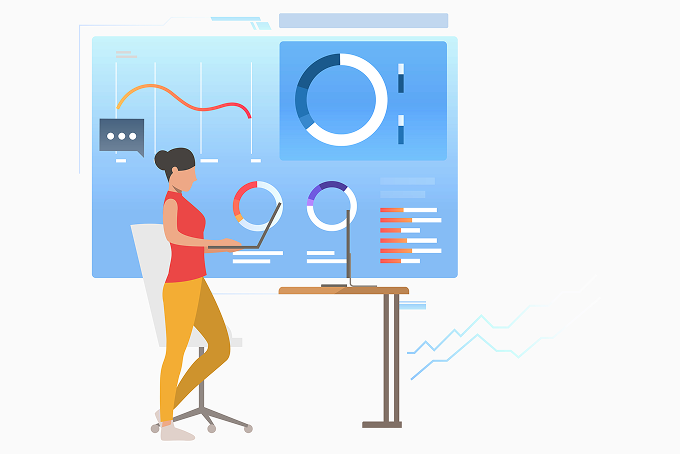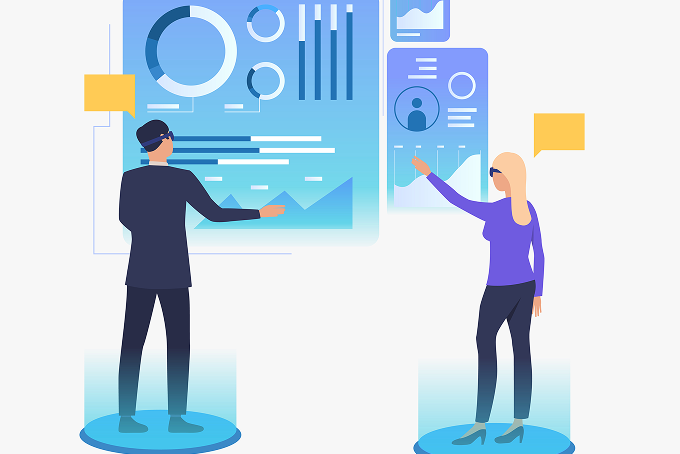Data Science: What Is It And Why Is It Crucial?
Finding meaningful patterns in large amounts of unstructured data is at the heart of data science. Data scientists work to make sense of "big data," the enormous quantities of information kept by contemporary businesses. The data science industry employs a wide variety of professionals, including analysts, statisticians, engineers, and scientists. Applying scientific methods, algorithms, and systems allows us to extract value from massive data sets. The relevance of data and its future ramifications are of interest to this group. The value of data science to businesses is enormous. It can help businesses automate processes for more efficiency, make decisions based on data, enhance their products, and plan for and anticipate future business events. Companies are able to make exactly what customers want, when they want it, thanks to big data, which is boosting business processes and lowering expenses. Big data has the potential to aid marketers in determining which consumers are worth the most and how to convert less valued ones into profitable ones through customer contact channels such as loyalty programs. Data science is transforming businesses in every industry, therefore it's crucial for CEOs to know how to use it. Experts in data-intensive fields can stay ahead of the competition by acquiring data science skills.
The nine most critical data science skills for professionals are as follows, and they are applicable whether your goal is to enter the field or simply to understand how to utilize data to achieve business outcomes.
9 Basic Data Science Skills for People Who Work
1. Critical Thinking
Data science wants to help businesses by looking at and making sense of data. This means that anyone who wants to be good at data analysis needs to be able to think critically. To be a data scientist, you need to be able to find patterns in data, run tests, and find problems in the business world. Anyone who wants to work with data needs to be able to think critically.
2. Compatibility with Mathematics
You don't have to be great at math to work in data science, but it will help you when you have to do more complicated analysis. A data scientist should know a lot about statistics in addition to having a lot of experience. You can also learn more about machine learning systems by studying linear algebra and computer math. In acquiring online learning you can learn more about machine learning.
3. Data Visualization
Data visualization skills are essential for individuals who work in both the commercial world and the field of data science. Having the ability to transform raw data into pictures that are not only interesting but also convey a story is a requirement. When communicating with your stakeholders, it is preferable to provide them with data in a format that is easily understood by them rather than simply providing them with a list of numbers. As a means of simplifying the reading of data, those who are employed in the business world ought to be familiar with the use of histograms, pie charts, and bar charts.
4. Skills in programming
Python and R are widely used computer languages for data analysis and handling complex statistical challenges. Additionally, understanding database querying languages such as SQL can make it simpler to retrieve and change data from databases. This is one of the benefits of learning these languages in online learning. While coding skills are desirable, they are not required for anyone just beginning to work with data. Mastering the art of data visualization and analysis should be your primary goal. In online learning you can gain the skills in programming.
5. Data Wrangling
Data wrangling, or prepping data for analysis, begins with cleaning up raw data. The process includes finding and fixing errors, adding missing pieces, sorting and moving the content to a different format, and so on.
Anyone who deals with data should learn this skill because it speeds up and organizes the process of evaluating data. You can receive important information from data faster if you clean it up and put it in the optimal format for viewing.
6. Business Language Fluency
It's crucial to know how to speak business in any sector. But in data science, it is a must. One of the main jobs of those who work with big data is to make sense of massive numbers that help businesses make decisions, like KPIs, quotas, and supply and demand. No matter what field you're in, improving your business abilities can help you see how data relates to your business goals.
7. Communication
You can't just read data; you also need to know how to use it in a business setting and explain your results to coworkers and stakeholders, especially if they aren't very tech-savvy. Whenever you can, try to use data visualizations in your presentations. This will help your audience comprehend what the numbers imply. Your visualizations should be clear on their own, but it's also a good idea to include any computations or other information that can help make the data clearer. Communication skills can be gained through online education much easier.
8. Machine Learning
As AI becomes more common, machine learning is an extremely important skill for anyone who deals with large amounts of data. When computer algorithms learn and alter on their own based on data, that's called machine learning. Some ways that organizations apply machine learning are to control risk, analyze performance, trade, and automate jobs. If you learn the basics of online learning, you may better understand your business and make it run more smoothly by automating processes.
9. Ethical Skills
You might not think of ethics when you want to learn more about data science, but you should. When it comes to big data, there is a huge moral issue with keeping customers' information private. People are sharing more information online than ever before, and this helps businesses deliver their customers better, and through online learning this gives more personalized experiences. It's very vital to remember your clients privacy while you look at the data. When it comes to how they handle data privacy, both data scientists and business executives need to follow a set of guidelines.
What are the benefits of taking a data science class for people who work?
1. Learn the Latest Skills
The main reason for working professionals to take an online education in data science courses is to learn new skills and go up in their careers. These kinds of classes can help people develop useful skills like data visualization, data storytelling, machine learning, and more.
2. Gain Industry Insights
Data science courses not only teach you useful skills, but they also give you useful information about the field. It helps professionals become specialists in their fields, which leads to high-paying jobs.
3. Data-Driven Innovation
If a working professional can come up with new ideas and ways to make additional business, their value gets boosted by a lot. This is where a data science course for people who work comes in. It helps you learn how to find patterns in data and make sense of them. So, it makes innovation based on data easier.
4.Enhanced Decision-Making
Data science is very important for looking at patterns and trends in data. It helps predict what will happen in the future and how it will affect the company. So, it lets professionals make judgments and prepare strategically based on facts. So, it helps people become better leaders.
5. Networking Opportunities
Online education data science courses for those who work encourage networking events, online education groups, and discussion forums. So, they provide you many chances to talk to teachers, mentors, and other students. Also, taking this kind of training might help you make professional connections that can lead to new chances.
The Importance of Data Science Skills
People who wish to become data scientists or work in business and make a difference at work should learn data science skills. You need to know how to program and use machine learning to comprehend data science, but you also need to have soft skills like critical thinking and ethics. And online education makes it easier to acquire these skills No matter what field you work in or what your job title is, learning about data science tools and concepts may help you make better decisions based on data, evaluate how well your company is doing, and plan for the future.


